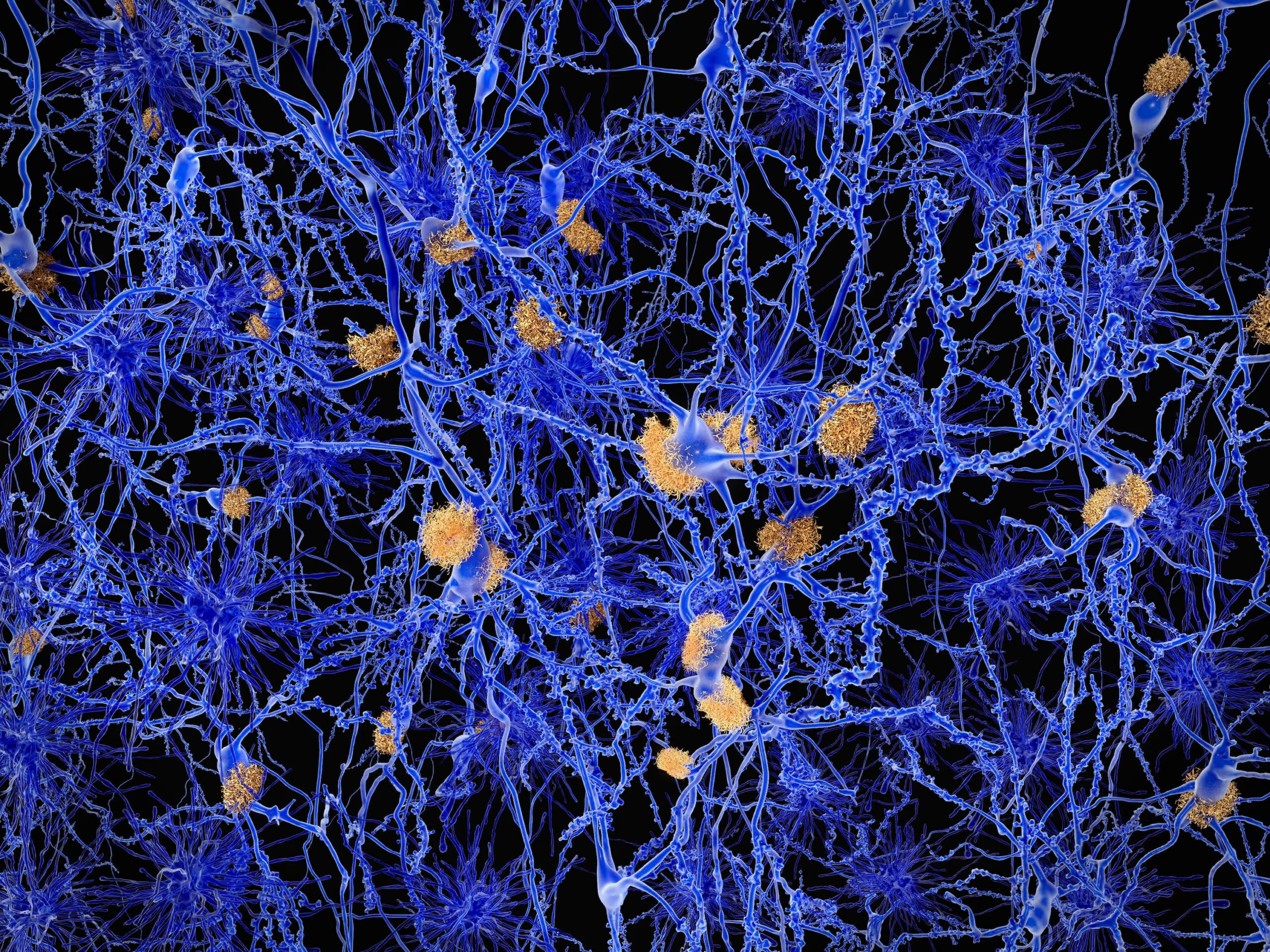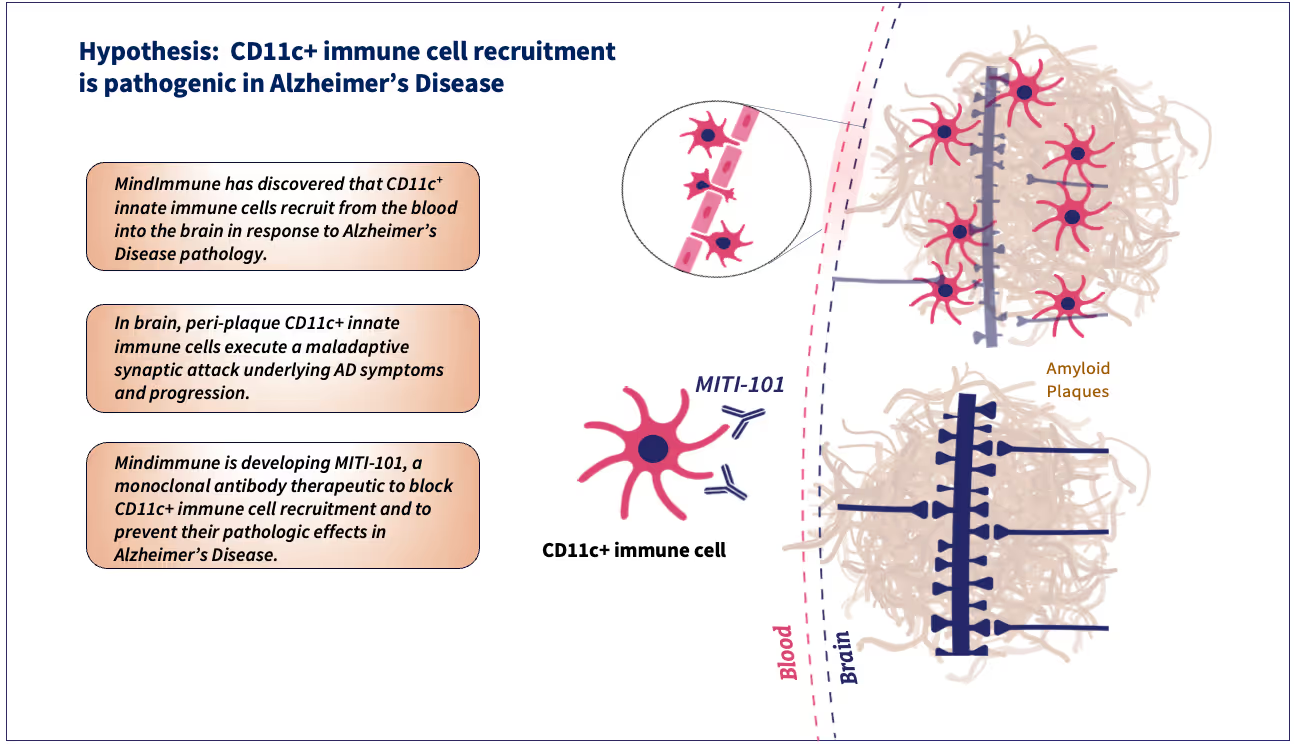MindImmune was founded to capitalize on and more fully explore connections between the immune and nervous systems.

Our Science
In neurodegenerative diseases, including Alzheimer’s disease, the immune system plays a critical role in driving disease pathology. MindImmune’s approach aims at redirecting the immune system to create resilience to neurodegenerative diseases.
'nipping Alzheimer's disease in the blood'
MindImmune has discovered that an innate immune cell migrating from the blood into the brain causes the synaptic damage at the core of Alzheimer’s symptoms and progression. MITI-101, our flagship program, is a novel antibody therapeutic that ameliorates this synaptic damage by specifically preventing these innate immune cells from entering the brain
'nipping Alzheimer's disease in the blood'
MindImmune has discovered that an innate immune cell from the blood enters the brain and causes the synaptic damage at the core of Alzheimer’s symptoms and progression. MindImmune is developing a novel antibody therapeutic that ameliorates this synaptic damage simply by preventing these immune cells from entering the brain.

For decades, researchers have targeted amyloid and tau proteins in their efforts to understand Alzheimer’s disease and develop therapeutics to combat it, but focusing on amyloid and tau has not yielded therapeutics that dramatically impact the course of disease. An established and growing body of literature supports a link between neuroinflammation and Alzheimer’s pathology, suggesting powerful new therapeutic approaches.
MindImmune’s R&D has explored and understood the inflammatory drivers of degenerative CNS disorders like Alzheimer’s, uncovering that CD11c+ cells, a subset of innate immune cells originating in the periphery can be recruited into the brain where they surround amyloid plaques. In the brain, these cells play a key role in Alzheimer’s disease pathogenicity by driving neuro-inflammatory processes that result in the destruction of the synapses essential to healthy neural connections, resulting both in the cognitive symptoms and relentless progression of Alzheimer’s disease. We have generated preclinical data in mouse models of Alzheimer’s disease demonstrating that eliminating CD11c+ cells reduces signs of synaptic dystrophy.
MindImmune is developing a therapeutic monoclonal antibody (MITI-101) designed to block recruitment of CD11c+ innate immune cells into the brain, which will prevent the cells from causing the synaptic damage that drives cognitive symptoms and progression in Alzheimer’s disease.

Blocking these immune cells from entering the brain prevents the damage they do to synapses. Synaptic damage is the core pathology in Alzheimer’s disease, causing the day-to-day cognitive symptoms as well as the insidious progression of the disease. Thus, blocking immune cell recruitment may improve cognitive symptoms and slow the progression of this devastating disease.
MindImmune’s therapeutic strategy for Alzheimer’s disease is applicable to a range of neurodegenerative disorders as well as to the other chronic inflammatory conditions.
We are developing a pipeline of therapeutics tailored to the aberrant immune system activity that drives these diseases.
'nipping Alzheimer's disease in the blood'
MindImmune has discovered that an innate immune cell from the blood enters the brain and causes the synaptic damage at the core of Alzheimer’s symptoms and progression. MindImmune is developing a novel antibody therapeutic that ameliorates this synaptic damage simply by preventing these immune cells from entering the brain.


Biochemical Pharmacology, 2024
Hiding in Plain Sight: Do Recruited Dendritic Cells Surround Amyloid Plaques in Alzheimer’s Disease?
Authors: Robert B. Nelson, Kenneth N. Rose, Frank S. Menniti, Stevin H. Zorn
Recruitment of innate immune cells in Alzheimer’s disease (AD) brain has been reported by several labs using a number of techniques but remains controversial. Nelson et al. critically review and integrate this literature, concluding that two distinct populations of innate immune cells appear to be recruited in AD brain. One of these two cell types surrounds amyloid plaques, has a phenotype consistent with myeloid dendritic cells, and has previously been termed “disease-associated microglia” by the AD field.

Excessive reservations and paralyzing despondency have not helped the sciences to advance nor are they helping them to advance, but a healthy optimism that cheerfully searches for new ways to understand, as it is convinced that it will be possible to find them.
— Alois Alzheimer

